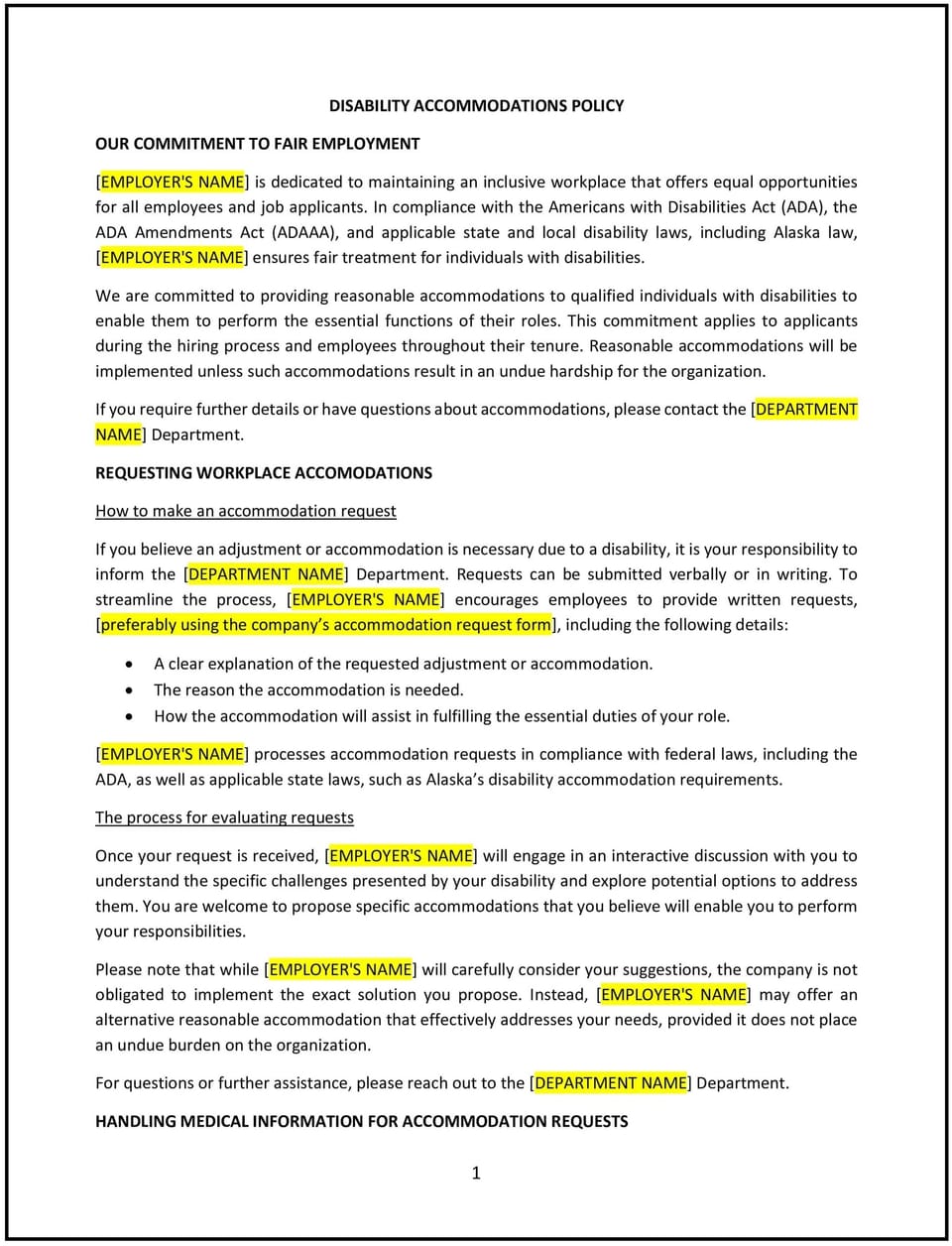Disability accommodations policy (Alaska): Free template

Disability accommodations policy (Alaska)
In Alaska, a disability accommodations policy provides clear guidelines for supporting employees with disabilities, ensuring a fair and inclusive workplace. This policy outlines the company’s commitment to providing reasonable accommodations that enable employees to perform their job duties effectively. By implementing a well-structured policy, businesses can foster diversity, improve employee satisfaction, and support compliance with legal obligations.
Given Alaska’s unique work environments, such as remote locations and seasonal industries, businesses may need to address specific challenges, like accommodating mobility issues in harsh weather or providing remote work solutions.
How to use this disability accommodations policy (Alaska)
- Define reasonable accommodations: Specify what constitutes reasonable accommodations, such as modified workspaces, flexible schedules, assistive devices, or remote work options.
- Provide an accommodation process: Outline the steps employees should take to request accommodations, including documentation requirements and timelines for employer responses.
- Assign responsibility: Designate individuals or departments, such as HR or a compliance officer, to manage accommodation requests and ensure timely resolutions.
- Promote confidentiality: Assure employees that all accommodation requests and related medical information will be handled with strict confidentiality.
- Educate managers: Train supervisors to recognize accommodation needs and handle requests sensitively, ensuring compliance with company policies and legal standards.
Benefits of using a disability accommodations policy (Alaska)
A disability accommodations policy provides numerous advantages for businesses in Alaska. Here’s how it helps:
- Encourages inclusivity: Demonstrates the company’s commitment to creating an equitable and supportive workplace for employees with disabilities.
- Supports compliance: Helps businesses adhere to the Americans with Disabilities Act (ADA) and other relevant laws by providing clear procedures for accommodations.
- Improves employee retention: Supports employees with disabilities, fostering loyalty and reducing turnover by addressing their needs effectively.
- Enhances workplace morale: Promotes a culture of respect and understanding, improving relationships among employees and management.
- Boosts productivity: Enables employees with disabilities to perform their job duties effectively, contributing to overall team success.
Tips for using a disability accommodations policy (Alaska)
- Tailor accommodations: Customize solutions based on the specific needs of employees and the nature of their roles, considering Alaska’s unique work environments.
- Regularly review the policy: Ensure the policy reflects changes in legal requirements, business operations, or employee needs.
- Monitor implementation: Track the effectiveness of accommodations and make adjustments as necessary to address evolving challenges.
- Encourage open communication: Foster an environment where employees feel comfortable discussing their accommodation needs without fear of judgment or reprisal.
- Provide additional resources: Offer access to tools, training, or external support services to help employees with disabilities succeed in their roles.
Q: What qualifies as a reasonable accommodation under this policy?
A: Reasonable accommodations include adjustments or modifications that enable employees with disabilities to perform essential job functions without imposing undue hardship on the employer.
Q: How should employees request accommodations?
A: Employees should follow the company’s outlined process, which typically includes submitting a formal request to HR or a designated manager and providing necessary documentation.
Q: What should employers consider when evaluating accommodation requests?
A: Employers should assess whether the requested accommodation is reasonable, does not impose undue hardship, and effectively addresses the employee’s needs.
Q: How does this policy protect employee privacy?
A: All medical information and accommodation requests are handled confidentially, with access limited to authorized personnel directly involved in the process.
Q: How often should this policy be reviewed?
A: The policy should be reviewed annually or whenever significant changes occur in legal requirements or business operations.
This article contains general legal information and does not contain legal advice. Cobrief is not a law firm or a substitute for an attorney or law firm. The law is complex and changes often. For legal advice, please ask a lawyer.


